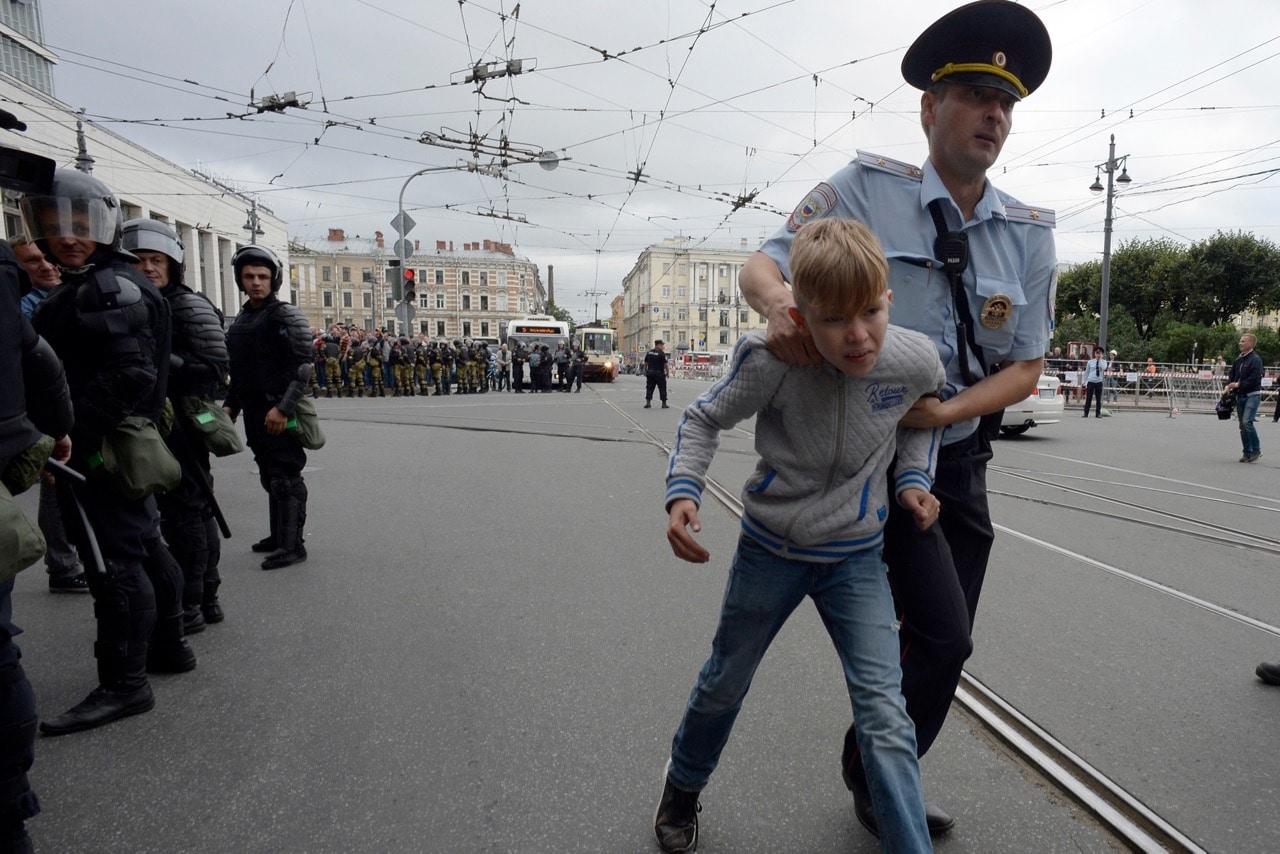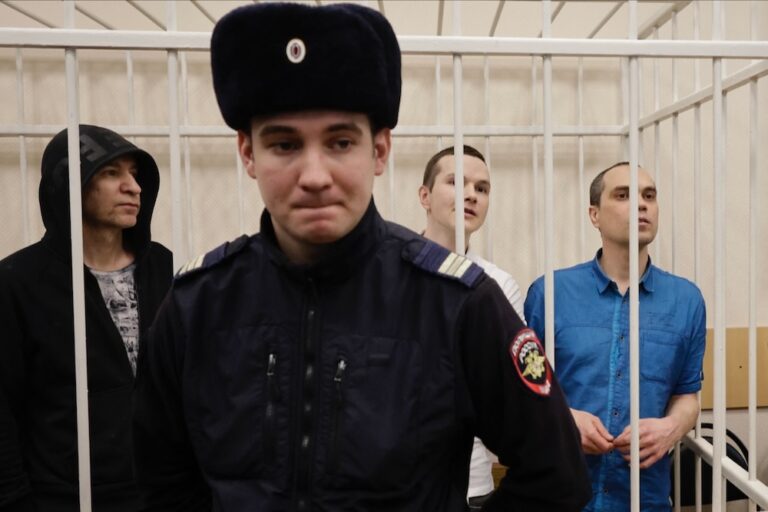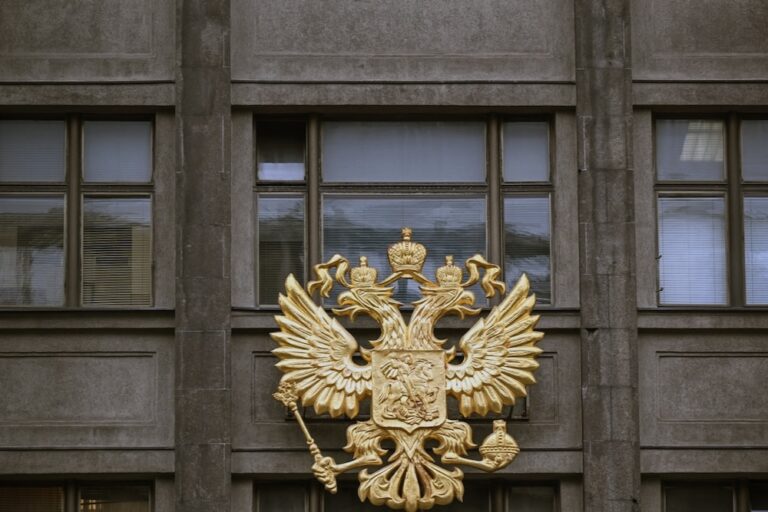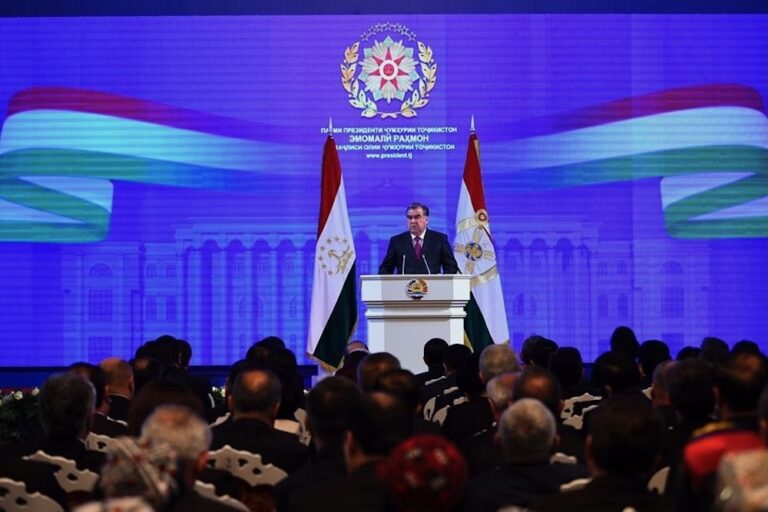A roundup of key free expression news in Europe and Central Asia, based on IFEX member reports.
Gender focus: A freethinking daughter of Kyrgyzstan
Zere Asylbek, a 19-year-old songwriter, has provoked a debate about women’s rights in Kyrgyzstan, where the video of one of her songs – Kyz (meaning “Girl”) – has earned her both praise and death threats. The song, which calls for women’s equality and freedom of expression (and which has been described as a feminist manifesto) was released some months ago, but its video – in which Asylbek performs wearing a purple bra while other women wear the hijab, a bikini and jeans – was only released in September and quickly went viral.
“Almost any girl in our country has had at least one kind of violation”#ZereAsylbek received death threats over her attire in video in her song #Kyz#Freemuse calls for Kyrgyz authorities to ensure the safety of Asylbek and launch a criminal investigation into the threats pic.twitter.com/Xr8PGeueao
— Freemuse (@Freemuse98) September 20, 2018
Legislatively and culturally, Kyrgyzstan is an extremely conservative country: discrimination against women is routine, and domestic violence, kidnap and forced marriage are common. So it’s no surprise that Asylbek’s message – that women should be allowed to dress and express themselves completely freely – has attracted some truly disturbing threats online. However, she has also received lots of support from women who have been showing solidarity by posting photos of themselves in their bras on social media. Asylbek’s father has also defended her free expression publicly: “Zere is my daughter” he said, “a freethinking daughter of free Kyrgyzstan”.
“Terrorist propaganda”
The end of September saw another hearing in the ongoing trial in Turkey of the publisher Ragıp Zarakolu. He was arrested in 2011 and charged, absurdly, with “aiding and abetting an illegal organisation” following a speech he gave at an event by the now defunct pro-Kurdish Peace and Democracy (BDP) party. He faces up to 15 years in prison if convicted. PEN International called for the charges against him to be dropped. The International Publishers Association criticised the Turkish authorities for abusing the Interpol red notice system to try to force Zarakolu (who now lives in Sweden) to attend the proceedings in Istanbul. The next hearing in Zarakolu’s trial will be on 30 November.
At the start of the month, Reporters Without Borders (RSF) reminded us that there are more than 50 journalists currently on trial on “terrorist propaganda” charges; towards the end of the month, three Hayatın Sesi TV executives – Mustafa Kara, Gökhan Çetin and İsmail Gökhan Bayram – were convicted on that very charge, and each was sentenced to three years and nine months in prison. The trial was observed by the International Press Institute’s Caroline Stockford, who provided this video report:
International Press Institute (@globalfreemedia)’s Caroline Stockford (@CarolineStockf1) has observed the Hayatın Sesi TV trial today and commented on 3 years 9 months prison sentences announced for three executives of the TV network. #dokuz8/@obefintlig pic.twitter.com/x6qYHEG8Nr
— dokuz8 NEWS (@dokuz8_EN) September 19, 2018
Three well-known journalists, Ahmet Altan, Mehmet Altan and Nazlı Ilıcak were in court appealing the life sentences handed to them in February after they were convicted on charges related to the 2016 failed coup attempt. Their appeal hearing was adjourned until October.
Austrian journalist Max Zirngast was detained this month on charges of “membership of a terrorist organisation”; he is now in pre-trial detention.
But there was also good news in September: Academic for Peace, Hanifi Barış, was released from pre-trial detention (he is charged with conducting “terrorist propaganda”). He had been in jail since July. His trial will continue in December.
For a thorough overview of all the cases of persecuted journalists and activists, please check out the regular updates provided by Bianet, the Committee to Protect Journalists (CPJ), the Platform for Independent Journalism (plus its sister site Expression Interrupted) and the Initiative for Freedom of Expression – Turkey.
The “mad printer” and a poisoned journalist
Russia’s Duma, which, as RSF notes, is often dubbed the “mad printer” for the speed at which it churns out new laws, continued its legislative assault on free expression this month by passing two bills imposing draconian punishments for failure to remove banned online content. Those who infringe the law will face up to two years in prison.
Jailed Ukrainian filmmaker Oleg Sentsov was nominated for the prestigious Sakharov Prize for Freedom of Thought. Currently serving a 20-year jail sentence in Russia, Sentsov was convicted on dubious terrorism charges in 2015; he has been on hunger strike since May 2018 and his physical condition is reported to be very poor.
September saw the three-month anniversary of the disappearance of website editor Leonid Makhinya, who was last seen in Volgograd in July. His website, the Volgogradsky Reporter, is an independent news outlet and has often criticised the local authorities.
On 9 September, the police violently broke up demonstrations in cities across Russia, arresting hundreds of protesters, including children. The rallies, which were organised to protest pension reforms, were overwhelmingly peaceful, though most had not been officially “authorised”. One of the organisers, opposition leader Alexei Navalny, was placed in preventative detention last month to stop him attending the rallies.
Hundreds were arrested on September 9 as protests against the raising of the retirement age were held across Russia. https://t.co/XDdwfgjGan pic.twitter.com/YiBTYhLFbm
— Radio Free Europe/Radio Liberty (@RFERL) September 9, 2018
On 12 September, the Supreme Court upheld the verdict delivered by the Moscow City Court regarding Ukrainian journalist Roman Sushchenko, who was sentenced to 12 years in a high-security prison. Sushchenko had been convicted of spying for Ukraine whilst on holiday in Moscow in 2016. Rights groups have criticised the verdict, citing the lack of evidence presented against the journalist, and the International and European Federations of Journalists have urged the Russian authorities to release him.
Pussy Riot member and founder of the independent news website Mediazona, Pyotr Verzilov, is undergoing hospital treatment, and there are concerns he was poisoned. According to reports, he had been trying to shed light on the murders of three Russian journalists in the Central African Republic in July (the journalists had been investigating the activities of Russian mercenaries in the African state).
MEPs examining Malta again
A delegation of Members of the European Parliament (MEPs) visited Malta this month to assess rule of law, corruption and the safety of journalists on the island. One of the key subjects raised by the MEPs when they met with the Maltese government was the October 2017 murder of journalist Daphne Caruana Galizia. The delegation asked the government to stop all hate speech directed at the family, drop all libel cases against the late journalist (the Prime Minister and his wife are still suing her), and resolve the situation around the makeshift memorial to Daphne in Valleta (which the authorities keep trying to dismantle). According to reports, the government told the delegation that they could do something about the memorial….
The Maltese authorities’ commitment to carrying out a thorough investigation into Daphne’s murder has been questioned frequently by journalists, activists and politicians all over Europe. This month, Pieter Omtzigt, the special rapporteur of the parliamentary assembly of the Council of Europe on Daphne’s murder, announced that Malta had actually tried to withdraw his mandate.
Mr. Mallia (Malta) proposed to withdraw my mandate on the report on the assassination of Daphne Caruana GaliziaHe did not get support in the committee pic.twitter.com/HLKJ70hk2m
— Pieter Omtzigt (@PieterOmtzigt) September 10, 2018
A dictator’s honour is no laughing matter
In Spain, entertainers are in the free expression spotlight again.
El Gran Wyoming, one of Spain’s best known TV commentators and political satirists, his co-presenter, and the TV channel La Sexta, will be taken to court by the far-right Franco Foundation which accuses them of “offending the honour” of Spain’s deceased fascist dictator, Francisco Franco. This comes after Wyoming parodied the exhumation of Franco’s body on his show (Franco’s body will actually be exhumed and moved to another burial place later this year). Since the complaint was filed, Wyoming and his colleagues have been using it to make fun of the dictator and the Foundation, and they have received lots of support on social media.
VÍDEO | ¿Dónde quiere descansar realmente Franco? Esta noche, Wyoming y @DaniMateoAgain le preguntan en @El_Intermedio https://t.co/HnBJkU4X5e #elintermedio
— laSexta (@laSextaTV) September 13, 2018
Actor Willy Toledo was arrested after he refused (once again) to attend court for a hearing of a complaint lodged against him by the Spanish Association of Christian Lawyers. He is accused of “insulting religious sentiments” following a 2017 Facebook post. Toledo, who was released from custody on Thursday, says that he is using the complaint against him to highlight the fact that offences against religious feelings still figure in Spain’s criminal code.
Spain’s Attorney General, María José Segarra, has suggested that it might be time to re-think the harsh sentencing of social media users convicted of “inciting hatred”. Currently, these social media users face stiff prison sentences, but Segarra says that alternative punishments could be introduced in cases where “the context, content, absence of repetition or personal circumstances [of the social media user]” justify treating the crime less harshly.
UK intelligence spies on IFEX member
MI5, an intelligence agency in the UK, spied on IFEX member Privacy International, it was revealed this month, capturing and reading the organisation’s private data as part of its mass surveillance programmes. In addition to this, the three big intelligence agencies – MI5, GCHQ and MI6 – also admitted that they unlawfully collected data on Privacy International or its staff.
These revelations come after a big win earlier in the month for Privacy International and other rights groups, when the European Court of Human Rights ruled that the UK’s mass interception programme violated the rights of privacy and free expression by not providing sufficient surveillance safeguards.
Privacy International has written to the UK’s Home Secretary demanding that he take action against the spy agencies.
Following revelations that a UK spy agency unlawfully spied on PI, we have written to the Home Secretary asking him to instruct the agencies to provide a full explanation as to why they unlawfully held & analysed our data.https://t.co/0JycDM40vkDocs: https://t.co/0NbJa8rKVw pic.twitter.com/KdQlJotndM
— Privacy International (@privacyint) September 25, 2018
On 12 September, EU lawmakers approved the controversial Copyright Directive. Those in favour of the new legislation – such as the International Federation of Journalists (IFJ) – say that it will ensure that artists, creators and journalists will be fairly remunerated for their work when it appears online; those against – such as Electronic Frontier Foundation (EFF) – says that it “sets the stage for mass, automated surveillance and arbitrary censorship of the internet”. Visit IFJ’s and EFF’s websites for more detail on their positions.
In Brief
In Slovakia police have arrested a number of suspects in connection with the February 2018 murders of investigative journalist Jan Kuciak and his fiancée Martina Kusnirova. Before he was killed, Kuciak had been looking into links between organised crime and Slovakian politicians; his murder triggered the collapse of the government.
Denationalisation is sometimes used as a tool of persecution, as Azerbaijani IFEX member Emin Huseynov knows to his cost. Huseynov is the founder and director of the Institute for Reporters’ Freedom and Safety; he was stripped of his citizenship by the government of Azerbaijan in 2015 and currently lives in Switzerland. This month, IFEX joined International Media Support, CPJ and the International Senior Lawyers Project in submitting a joint third-party intervention to the European Court of Human Rights in Huseynov’s case against Azerbaijan. The journalist is arguing that that he has been illegally stripped of his citizenship in retaliation for his critical views.
MEPs voted to trigger the Article 7 sanctions procedure against Hungary this month for failing to uphold fundamental European values. Specifically, Prime Minister Orbán’s government has introduced draconian legislation targeting civil society and immigrants (for which it was condemned by UN experts), and is accused of threatening press freedom. It has also fuelled Islamophobia and used anti-Semitic tropes to attack the Jewish philanthropist George Soros. Triggering Article 7 is the first step in a long process which could ultimately lead to financial sanctions and suspension of voting rights.
#Breaking #Hungary: @EuroParl_EN decided to #VoteYes4Hungary and initiates #Article 7 by 448 Yes and 197 No. Over the 2/3 qualified majority required. pic.twitter.com/FB86Z26b4P
— Human Rights Watch (@hrw) September 12, 2018
In France, Marine Le Pen, the far-right leader of the Rassemblement National party (formerly known as the Front National) is facing prosecution for sharing online material considered to “incite terrorism”. If convicted, she faces having to pay a large fine and – potentially – three years in prison. The images she posted were of Islamic State atrocities.
Over a dozen journalists were targeted for attack during the anti-migrant demonstrations and riots in Chemnitz, Germany this month. It is reported that there were chants of “Lügenpresse” (lying press) during the protests. The OSCE Representative on Freedom of the Media condemned the attacks and provided some examples of the form they took.
In Ukraine, a man was jailed for four and a half years for his part in conspiring to murder the Russian journalist Arkady Babchenko in May 2018. Babchenko – working with Ukrainian intelligence agents – controversially faked his own murder in order to foil the assassination attempt, which Ukrainian authorities said had been ordered by the Russian FSB.
Human Rights Watch (HRW) published a report this month which deals with the possession of banned ‘extremist’ material in Kyrgyzstan. The report says that the law employs an overly-broad definition of ‘extremist’ and that hundreds of people are being convicted for holding outlawed material, regardless of what they do with it. According to HRW, much of the material is related to banned Islamic groups, but a lot of what has been used in prosecutions does not even contain calls to violence.



